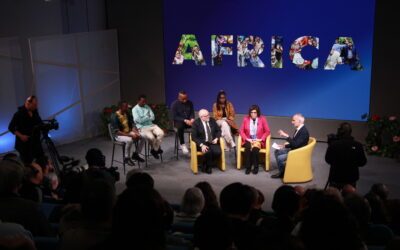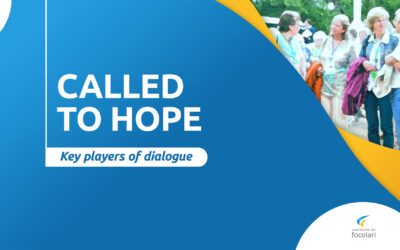 After describing the points of the Art of Loving, with the expressions that Chiara Lubich was fond of using, Maria Voce asked: “But how do you live this art which is not based on feelings or good intentions, but is practiced according to the measure intended by Jesus, which is to lay down one’s life? Is there a key, a secret that would help in making us more and more capable of living up to that measure?” Then she talked about the “culminating moment” of Jesus’s passion when he felt abandoned by the Father (Mt 27:46). Nevertheless, he placed himself in the Father’s hands (Lk 23:46), overcoming “that immense pain and with that he brought humankind into the bosom of the Father and into communion with one another.” “How can we live this mystery of the Forsaken-Risen Jesus? How are we to progress on the ecumenical journey when we clash over questions about truth? The Apostle Paul writes to the Philippians: ‘Have the same sentiments as Christ Jesus who even though he was in the form of God, did not consider equality with God something to be grasped at, but emptied himself and took on the form of a slave, being made in human likeness’ (cf Phil 2:5). With this attitude we are able to convey the truth of Christ in a way that is credible. Christ emptied himself of everything, as a gift of love.” She quoted from Pope Francis at the conclusion of the Week of Prayer for the Unity of Christians, on January 25th: “If we live this death to ourselves for Jesus, out old lifestyle is relegated to the past and, as happened to Paul, we enter into a new manner of life and of communion.” “Chiara Lubich calls this new manner of life: Jesus in our midst. She refers to Jesus’s promise to be in the midst of any who are united in his name, which means in his love (Mt 18:20). This presence of the Risen Lord amongst his own is determining for ecumenism.” From 1996, following an encounter with a thousand Anglicans and Catholics, Chiara began to talk about an “ecumenism of the people”. It was on that spirit that the journey of Together for Europe was begun, communion and collaboration among more than 300 movements and communities from different Churches. “Without authentic reconciliation,” Maria Voce affirmed, “we’ll never progress on the way towards unity. And this reconciliation characterizes the communion among the movements still today.” Finally, the president concludes: “In the light of the events in Lund on October 31, 2016 when Pope Francis and the President of the Lutheran World Federation, Bishop Dr Munib Younan, commemorated the beginning of the 500 years of the Reform, I felt I had to give a new push to the ecumenical involvement that marks our Movement.” The Declaration of Ottmaring was drawn up in the ecumenical community near Augsburg to “help us to think ecumenically, to remember that any brother or sister I meet, be they from my own Church or another Church, belong to the Body of Christ, to that body for which Christ gave his life. This is an absolute commitment we take on as Focolare Movement, and which can make us enter today into every aspect of human life. Ecumenism is a necessity of the times. It has to go forward. Because it corresponds to the need for God that everyone has, even unknowingly. If people are given the opportunity of an encounter with Jesus in the midst of Christians who love one another, their faith will be enkindled in them and their way of acting will change, they will seek justice and peace, and will work for solidarity among peoples. Only if we Christians are united will the world encounter God. See the full Italian text
After describing the points of the Art of Loving, with the expressions that Chiara Lubich was fond of using, Maria Voce asked: “But how do you live this art which is not based on feelings or good intentions, but is practiced according to the measure intended by Jesus, which is to lay down one’s life? Is there a key, a secret that would help in making us more and more capable of living up to that measure?” Then she talked about the “culminating moment” of Jesus’s passion when he felt abandoned by the Father (Mt 27:46). Nevertheless, he placed himself in the Father’s hands (Lk 23:46), overcoming “that immense pain and with that he brought humankind into the bosom of the Father and into communion with one another.” “How can we live this mystery of the Forsaken-Risen Jesus? How are we to progress on the ecumenical journey when we clash over questions about truth? The Apostle Paul writes to the Philippians: ‘Have the same sentiments as Christ Jesus who even though he was in the form of God, did not consider equality with God something to be grasped at, but emptied himself and took on the form of a slave, being made in human likeness’ (cf Phil 2:5). With this attitude we are able to convey the truth of Christ in a way that is credible. Christ emptied himself of everything, as a gift of love.” She quoted from Pope Francis at the conclusion of the Week of Prayer for the Unity of Christians, on January 25th: “If we live this death to ourselves for Jesus, out old lifestyle is relegated to the past and, as happened to Paul, we enter into a new manner of life and of communion.” “Chiara Lubich calls this new manner of life: Jesus in our midst. She refers to Jesus’s promise to be in the midst of any who are united in his name, which means in his love (Mt 18:20). This presence of the Risen Lord amongst his own is determining for ecumenism.” From 1996, following an encounter with a thousand Anglicans and Catholics, Chiara began to talk about an “ecumenism of the people”. It was on that spirit that the journey of Together for Europe was begun, communion and collaboration among more than 300 movements and communities from different Churches. “Without authentic reconciliation,” Maria Voce affirmed, “we’ll never progress on the way towards unity. And this reconciliation characterizes the communion among the movements still today.” Finally, the president concludes: “In the light of the events in Lund on October 31, 2016 when Pope Francis and the President of the Lutheran World Federation, Bishop Dr Munib Younan, commemorated the beginning of the 500 years of the Reform, I felt I had to give a new push to the ecumenical involvement that marks our Movement.” The Declaration of Ottmaring was drawn up in the ecumenical community near Augsburg to “help us to think ecumenically, to remember that any brother or sister I meet, be they from my own Church or another Church, belong to the Body of Christ, to that body for which Christ gave his life. This is an absolute commitment we take on as Focolare Movement, and which can make us enter today into every aspect of human life. Ecumenism is a necessity of the times. It has to go forward. Because it corresponds to the need for God that everyone has, even unknowingly. If people are given the opportunity of an encounter with Jesus in the midst of Christians who love one another, their faith will be enkindled in them and their way of acting will change, they will seek justice and peace, and will work for solidarity among peoples. Only if we Christians are united will the world encounter God. See the full Italian text
Live the present moment
Live the present moment




0 Comments